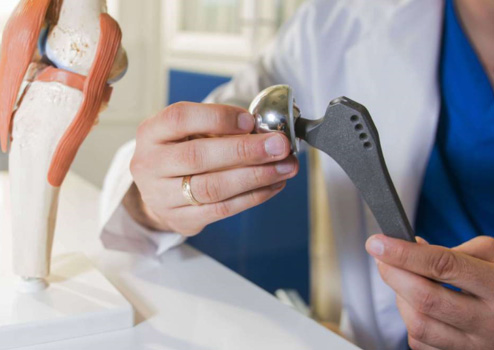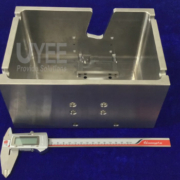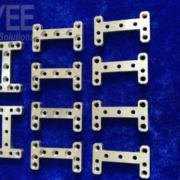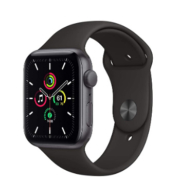How Are Titanium Machined Parts Used In The Medical Industry?
The medical field is regarded as having few opportunities for mistakes. When making medical parts, the same rule applies. It is because the industry deals with human life, and even minor mistakes can result in serious health problems or even death. As a result, the titanium CNC machining technique used by machinists to produce medical parts must have the capability to support tight tolerances and accuracy measurements.
Titanium machining is the best of all machining processes for meeting these objectives. Aside from being able to machine a wide range of materials, it can also meet the specifications listed above.
Usage of CNC and Titanium Machined Parts in Medical Industry
Medical precision parts are made using CNC medical machining and titanium machined parts because it is compatible with most of the specifications required in this critical industry.
-
Implants in Medical Industry
The fabrication of human body implants, including hip replacements and knee implants is one of the essential uses of Titanium CNC machining medical parts.
In most cases, medical professionals only require a modest number of implants. It means that injection molding, for example, will not be economical to employ. It is due to the fact that the production of mold will raise production expenses unnecessarily. Titanium CNC machining, on the other hand, allows machinists to reuse tools. They have no impact on production costs this way.
These are made of several metals, including titanium and polymers. CNC machining and titanium machined parts become a viable machining process as a result of this. It is owing to its versatility in terms of material compatibility. As a result, it is ideal for such manufacturing operations.
-
Machined Instruments for Surgical Purposes
Titanium CNC machining is useful to make surgical tools utilized by medical personnel during surgeries, in addition to body implants. Surgical scissors, blade handles, biopsy tubes, saws, cutters, implant holders, forceps, spacers, clamps, plate benders, and other metal components may be included.
This CNC-machined equipment and tools for surgical purposes must be created with accuracy and care, and they must meet additional safety standards such as sterilization ease.
Because of the critical requirement for precision, medical device makers utilize Titanium CNC machining. Small production runs are required for some tools and devices. Some of them are also custom-made for each patient. As a result, CNC machining proves to be the most cost-effective means of making these parts. To ensure no surface flaws, medical precision items can be treated to complete surface finishing procedures using titanium machined parts.

-
Electronic Equipment Machined Parts for Medical Industry
Surgical instruments have only one/ two pieces of metal. On the other hand, CNC machines is capable of making parts for considerably more complicated machinery like monitors of heart rate, X-ray machines, and MRI scanners.
Hundreds of thousands of separate parts may make up these pricey pieces of equipment, and many can also be produced using CNC machines. Small switches, buttons, levers, and bigger things like monitor housings are examples of machined equipment parts.
To avoid any potential of failure of machine, these components must meet high criteria, mainly since the equipment of a medical industry is frequently shifted across rooms in a hospital.
Unlike surgical tools and implants, these parts don’t have to be bio safe and compatible because they will not come into direct touch with multiple patients. Thus, a significantly more comprehensive range of titanium machining components and materials is available.
-
Micromachining
It entails the creation of extra little medical parts, as the name implies. It is mainly employed in devices that are implantable, exploratory tools for surgical purposes, technology for drug-delivery, and similar applications. These devices also have a higher sophistication level wrapped into a small package. As a result, making them necessitates an excellent level of competence. It is the reason why CNC medical machining is ideal. It is because it is capable of handling higher levels of precision. The components can also have feature sizes of less than 50 microns.
Micromachining is used to create stents, pacemaker components, catheters, ophthalmic devices, systems of drug delivery, tiny screws for implants and various medical devices, tiny tubes of plastic, and more in the business of medical instrument machining.
Why Use Titanium?
Titanium is known to have a cutting-edge application in defense (Like the US’s titanium hulls and naval submarines of Russia) as well as the space exploration (it is used in commercial and government satellite technology). Apart from that, it’s also become a crucial component of the World’s modern medical industry. It is the 81st element of the Periodic Table and is widely known to contain properties making it indispensable in dental implants, reconstructive surgery, external prostheses, as well as cardiovascular devices.
What are some of these characteristics? Titanium, for starters, is exceedingly corrosion-resistant. After all, there’s a reason why metal is used in constructing US Navy assault submarines, which may stay fully underwater for months at a time. Seawater is highly corrosive. The human body’s interior, with all of its arteries and organs, is the same way: it’s not the best place for metallic items. On the other hand, titanium is excellent for surgical implantation since metal can survive corrosion and rust so effectively, especially when it comes to something as demanding as assisting in pumping blood through the heart.
Surgical and medical professionals value titanium’s strength and lightweight mass and thus prefer the titanium machined parts. Surgeons have been able to fit amputated troops with new titanium limbs, allowing them to partake in some of the activities they could do before their injuries.
Conclusion
Medical instrument machining necessitates precision and accuracy, which is why machining titanium is a good fit for the job. However, the method won’t matter if the correct people don’t handle the work.



